Analyzing Cross-Cultural Management Styles: Saudi Arabia & Taiwan
VerifiedAdded on 2023/06/07
|6
|1257
|52
Essay
AI Summary
This essay provides a comparative analysis of cross-cultural management practices, focusing on team management and value systems in Saudi Arabia and Taiwan. It highlights the hierarchical management style in Saudi Arabia, influenced by Islamic laws and tribal traditions, where leaders are highly revered, and clear instructions are crucial. In contrast, Taiwan's management style, while also respecting age and position, involves more consultation with team members before decisions are made. The essay also explores the value systems in both countries, noting the importance of adhering to Islamic laws and building relationships in Saudi Arabia, while Taiwan emphasizes subtle gestures of respect and the value of individual opinions in business interactions. The conclusion emphasizes the significance of cultural awareness and adaptability for successful cross-cultural business engagements, underscoring the unique cultural nuances that shape management practices and value systems in each country. Desklib provides a platform for students to access similar assignments and study resources to enhance their understanding of diverse business topics.
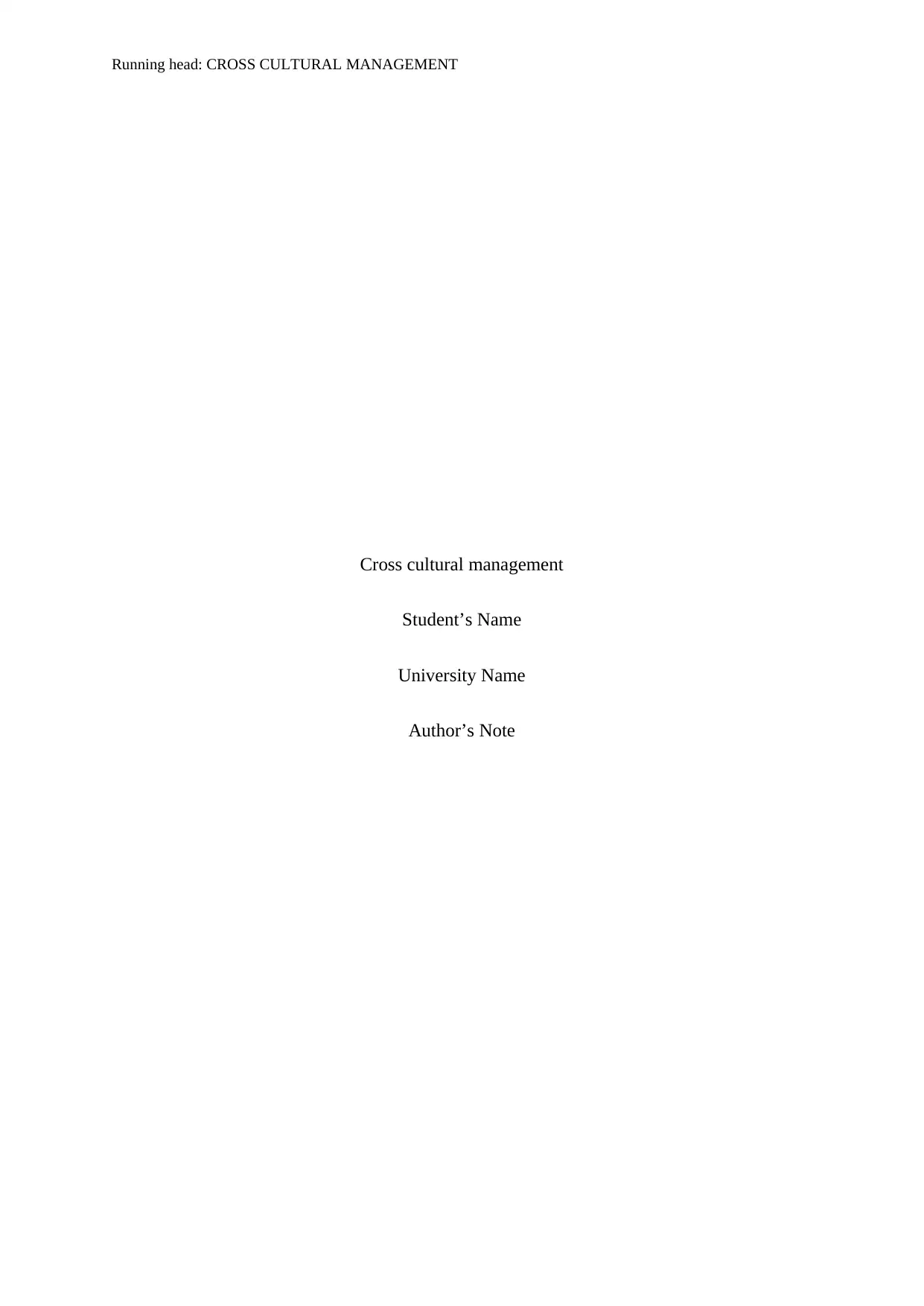
Running head: CROSS CULTURAL MANAGEMENT
Cross cultural management
Student’s Name
University Name
Author’s Note
Cross cultural management
Student’s Name
University Name
Author’s Note
Paraphrase This Document
Need a fresh take? Get an instant paraphrase of this document with our AI Paraphraser
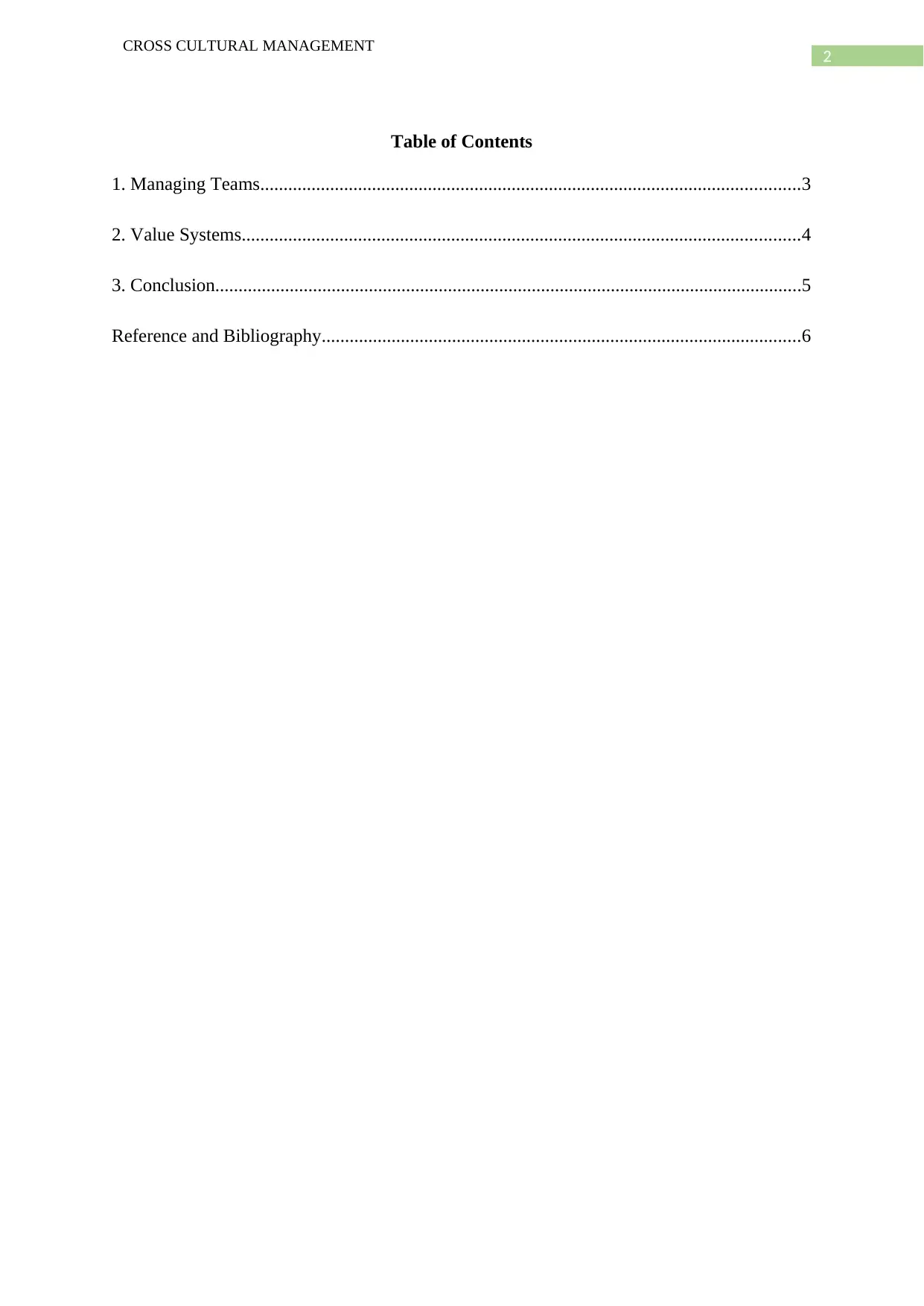
2
CROSS CULTURAL MANAGEMENT
Table of Contents
1. Managing Teams....................................................................................................................3
2. Value Systems........................................................................................................................4
3. Conclusion..............................................................................................................................5
Reference and Bibliography.......................................................................................................6
CROSS CULTURAL MANAGEMENT
Table of Contents
1. Managing Teams....................................................................................................................3
2. Value Systems........................................................................................................................4
3. Conclusion..............................................................................................................................5
Reference and Bibliography.......................................................................................................6
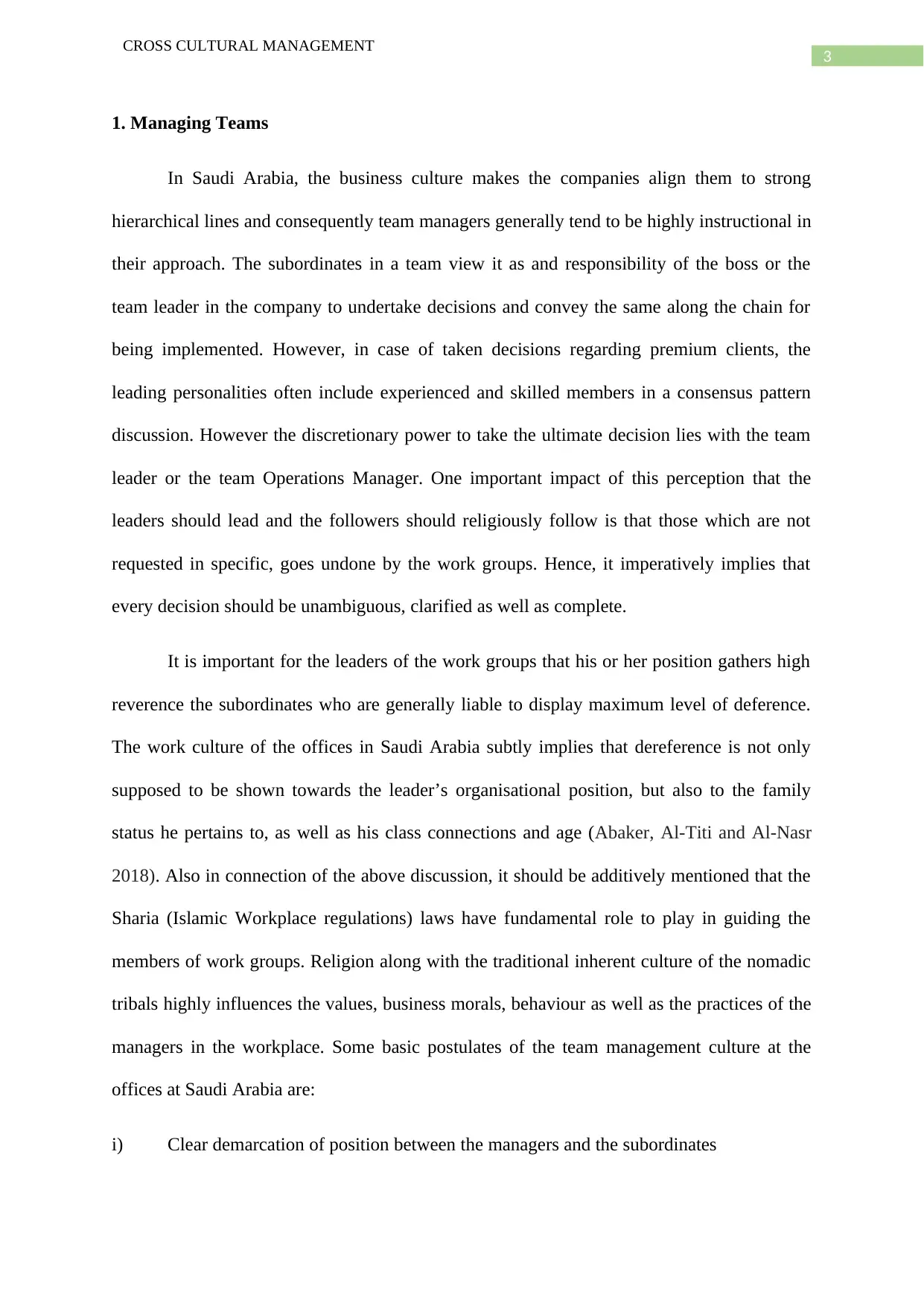
3
CROSS CULTURAL MANAGEMENT
1. Managing Teams
In Saudi Arabia, the business culture makes the companies align them to strong
hierarchical lines and consequently team managers generally tend to be highly instructional in
their approach. The subordinates in a team view it as and responsibility of the boss or the
team leader in the company to undertake decisions and convey the same along the chain for
being implemented. However, in case of taken decisions regarding premium clients, the
leading personalities often include experienced and skilled members in a consensus pattern
discussion. However the discretionary power to take the ultimate decision lies with the team
leader or the team Operations Manager. One important impact of this perception that the
leaders should lead and the followers should religiously follow is that those which are not
requested in specific, goes undone by the work groups. Hence, it imperatively implies that
every decision should be unambiguous, clarified as well as complete.
It is important for the leaders of the work groups that his or her position gathers high
reverence the subordinates who are generally liable to display maximum level of deference.
The work culture of the offices in Saudi Arabia subtly implies that dereference is not only
supposed to be shown towards the leader’s organisational position, but also to the family
status he pertains to, as well as his class connections and age (Abaker, Al-Titi and Al-Nasr
2018). Also in connection of the above discussion, it should be additively mentioned that the
Sharia (Islamic Workplace regulations) laws have fundamental role to play in guiding the
members of work groups. Religion along with the traditional inherent culture of the nomadic
tribals highly influences the values, business morals, behaviour as well as the practices of the
managers in the workplace. Some basic postulates of the team management culture at the
offices at Saudi Arabia are:
i) Clear demarcation of position between the managers and the subordinates
CROSS CULTURAL MANAGEMENT
1. Managing Teams
In Saudi Arabia, the business culture makes the companies align them to strong
hierarchical lines and consequently team managers generally tend to be highly instructional in
their approach. The subordinates in a team view it as and responsibility of the boss or the
team leader in the company to undertake decisions and convey the same along the chain for
being implemented. However, in case of taken decisions regarding premium clients, the
leading personalities often include experienced and skilled members in a consensus pattern
discussion. However the discretionary power to take the ultimate decision lies with the team
leader or the team Operations Manager. One important impact of this perception that the
leaders should lead and the followers should religiously follow is that those which are not
requested in specific, goes undone by the work groups. Hence, it imperatively implies that
every decision should be unambiguous, clarified as well as complete.
It is important for the leaders of the work groups that his or her position gathers high
reverence the subordinates who are generally liable to display maximum level of deference.
The work culture of the offices in Saudi Arabia subtly implies that dereference is not only
supposed to be shown towards the leader’s organisational position, but also to the family
status he pertains to, as well as his class connections and age (Abaker, Al-Titi and Al-Nasr
2018). Also in connection of the above discussion, it should be additively mentioned that the
Sharia (Islamic Workplace regulations) laws have fundamental role to play in guiding the
members of work groups. Religion along with the traditional inherent culture of the nomadic
tribals highly influences the values, business morals, behaviour as well as the practices of the
managers in the workplace. Some basic postulates of the team management culture at the
offices at Saudi Arabia are:
i) Clear demarcation of position between the managers and the subordinates
⊘ This is a preview!⊘
Do you want full access?
Subscribe today to unlock all pages.

Trusted by 1+ million students worldwide
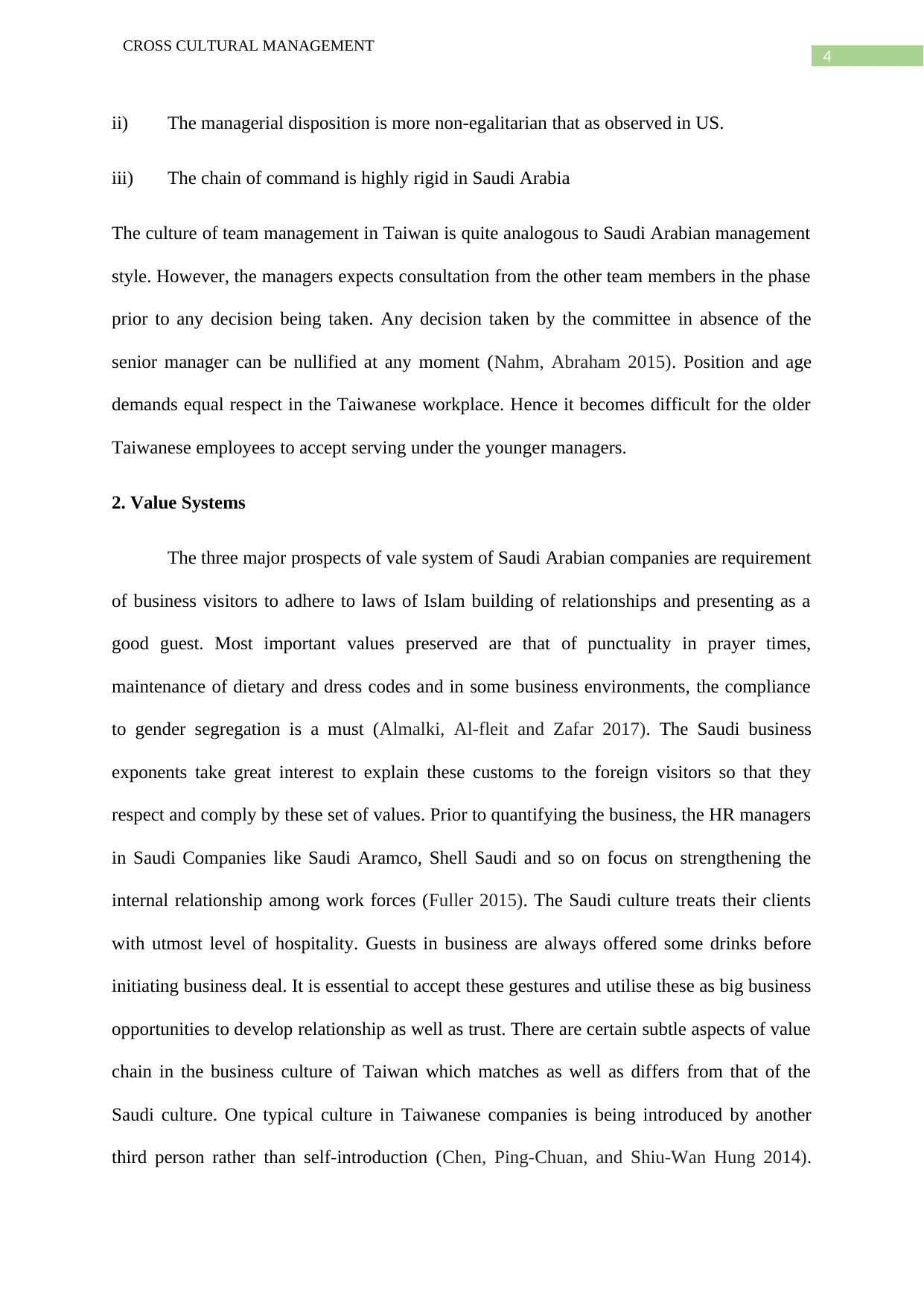
4
CROSS CULTURAL MANAGEMENT
ii) The managerial disposition is more non-egalitarian that as observed in US.
iii) The chain of command is highly rigid in Saudi Arabia
The culture of team management in Taiwan is quite analogous to Saudi Arabian management
style. However, the managers expects consultation from the other team members in the phase
prior to any decision being taken. Any decision taken by the committee in absence of the
senior manager can be nullified at any moment (Nahm, Abraham 2015). Position and age
demands equal respect in the Taiwanese workplace. Hence it becomes difficult for the older
Taiwanese employees to accept serving under the younger managers.
2. Value Systems
The three major prospects of vale system of Saudi Arabian companies are requirement
of business visitors to adhere to laws of Islam building of relationships and presenting as a
good guest. Most important values preserved are that of punctuality in prayer times,
maintenance of dietary and dress codes and in some business environments, the compliance
to gender segregation is a must (Almalki, Al-fleit and Zafar 2017). The Saudi business
exponents take great interest to explain these customs to the foreign visitors so that they
respect and comply by these set of values. Prior to quantifying the business, the HR managers
in Saudi Companies like Saudi Aramco, Shell Saudi and so on focus on strengthening the
internal relationship among work forces (Fuller 2015). The Saudi culture treats their clients
with utmost level of hospitality. Guests in business are always offered some drinks before
initiating business deal. It is essential to accept these gestures and utilise these as big business
opportunities to develop relationship as well as trust. There are certain subtle aspects of value
chain in the business culture of Taiwan which matches as well as differs from that of the
Saudi culture. One typical culture in Taiwanese companies is being introduced by another
third person rather than self-introduction (Chen, Ping-Chuan, and Shiu-Wan Hung 2014).
CROSS CULTURAL MANAGEMENT
ii) The managerial disposition is more non-egalitarian that as observed in US.
iii) The chain of command is highly rigid in Saudi Arabia
The culture of team management in Taiwan is quite analogous to Saudi Arabian management
style. However, the managers expects consultation from the other team members in the phase
prior to any decision being taken. Any decision taken by the committee in absence of the
senior manager can be nullified at any moment (Nahm, Abraham 2015). Position and age
demands equal respect in the Taiwanese workplace. Hence it becomes difficult for the older
Taiwanese employees to accept serving under the younger managers.
2. Value Systems
The three major prospects of vale system of Saudi Arabian companies are requirement
of business visitors to adhere to laws of Islam building of relationships and presenting as a
good guest. Most important values preserved are that of punctuality in prayer times,
maintenance of dietary and dress codes and in some business environments, the compliance
to gender segregation is a must (Almalki, Al-fleit and Zafar 2017). The Saudi business
exponents take great interest to explain these customs to the foreign visitors so that they
respect and comply by these set of values. Prior to quantifying the business, the HR managers
in Saudi Companies like Saudi Aramco, Shell Saudi and so on focus on strengthening the
internal relationship among work forces (Fuller 2015). The Saudi culture treats their clients
with utmost level of hospitality. Guests in business are always offered some drinks before
initiating business deal. It is essential to accept these gestures and utilise these as big business
opportunities to develop relationship as well as trust. There are certain subtle aspects of value
chain in the business culture of Taiwan which matches as well as differs from that of the
Saudi culture. One typical culture in Taiwanese companies is being introduced by another
third person rather than self-introduction (Chen, Ping-Chuan, and Shiu-Wan Hung 2014).
Paraphrase This Document
Need a fresh take? Get an instant paraphrase of this document with our AI Paraphraser
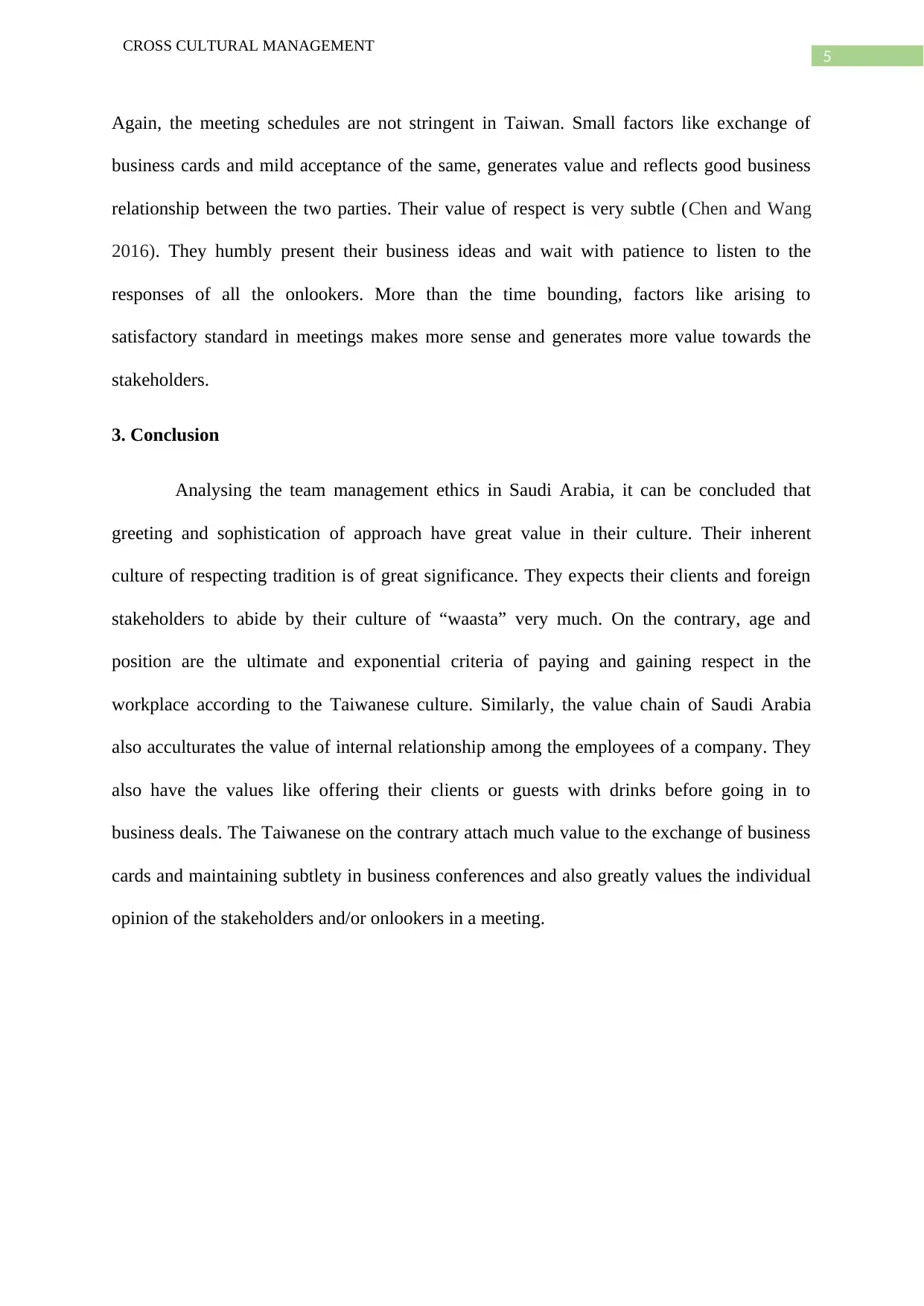
5
CROSS CULTURAL MANAGEMENT
Again, the meeting schedules are not stringent in Taiwan. Small factors like exchange of
business cards and mild acceptance of the same, generates value and reflects good business
relationship between the two parties. Their value of respect is very subtle (Chen and Wang
2016). They humbly present their business ideas and wait with patience to listen to the
responses of all the onlookers. More than the time bounding, factors like arising to
satisfactory standard in meetings makes more sense and generates more value towards the
stakeholders.
3. Conclusion
Analysing the team management ethics in Saudi Arabia, it can be concluded that
greeting and sophistication of approach have great value in their culture. Their inherent
culture of respecting tradition is of great significance. They expects their clients and foreign
stakeholders to abide by their culture of “waasta” very much. On the contrary, age and
position are the ultimate and exponential criteria of paying and gaining respect in the
workplace according to the Taiwanese culture. Similarly, the value chain of Saudi Arabia
also acculturates the value of internal relationship among the employees of a company. They
also have the values like offering their clients or guests with drinks before going in to
business deals. The Taiwanese on the contrary attach much value to the exchange of business
cards and maintaining subtlety in business conferences and also greatly values the individual
opinion of the stakeholders and/or onlookers in a meeting.
CROSS CULTURAL MANAGEMENT
Again, the meeting schedules are not stringent in Taiwan. Small factors like exchange of
business cards and mild acceptance of the same, generates value and reflects good business
relationship between the two parties. Their value of respect is very subtle (Chen and Wang
2016). They humbly present their business ideas and wait with patience to listen to the
responses of all the onlookers. More than the time bounding, factors like arising to
satisfactory standard in meetings makes more sense and generates more value towards the
stakeholders.
3. Conclusion
Analysing the team management ethics in Saudi Arabia, it can be concluded that
greeting and sophistication of approach have great value in their culture. Their inherent
culture of respecting tradition is of great significance. They expects their clients and foreign
stakeholders to abide by their culture of “waasta” very much. On the contrary, age and
position are the ultimate and exponential criteria of paying and gaining respect in the
workplace according to the Taiwanese culture. Similarly, the value chain of Saudi Arabia
also acculturates the value of internal relationship among the employees of a company. They
also have the values like offering their clients or guests with drinks before going in to
business deals. The Taiwanese on the contrary attach much value to the exchange of business
cards and maintaining subtlety in business conferences and also greatly values the individual
opinion of the stakeholders and/or onlookers in a meeting.
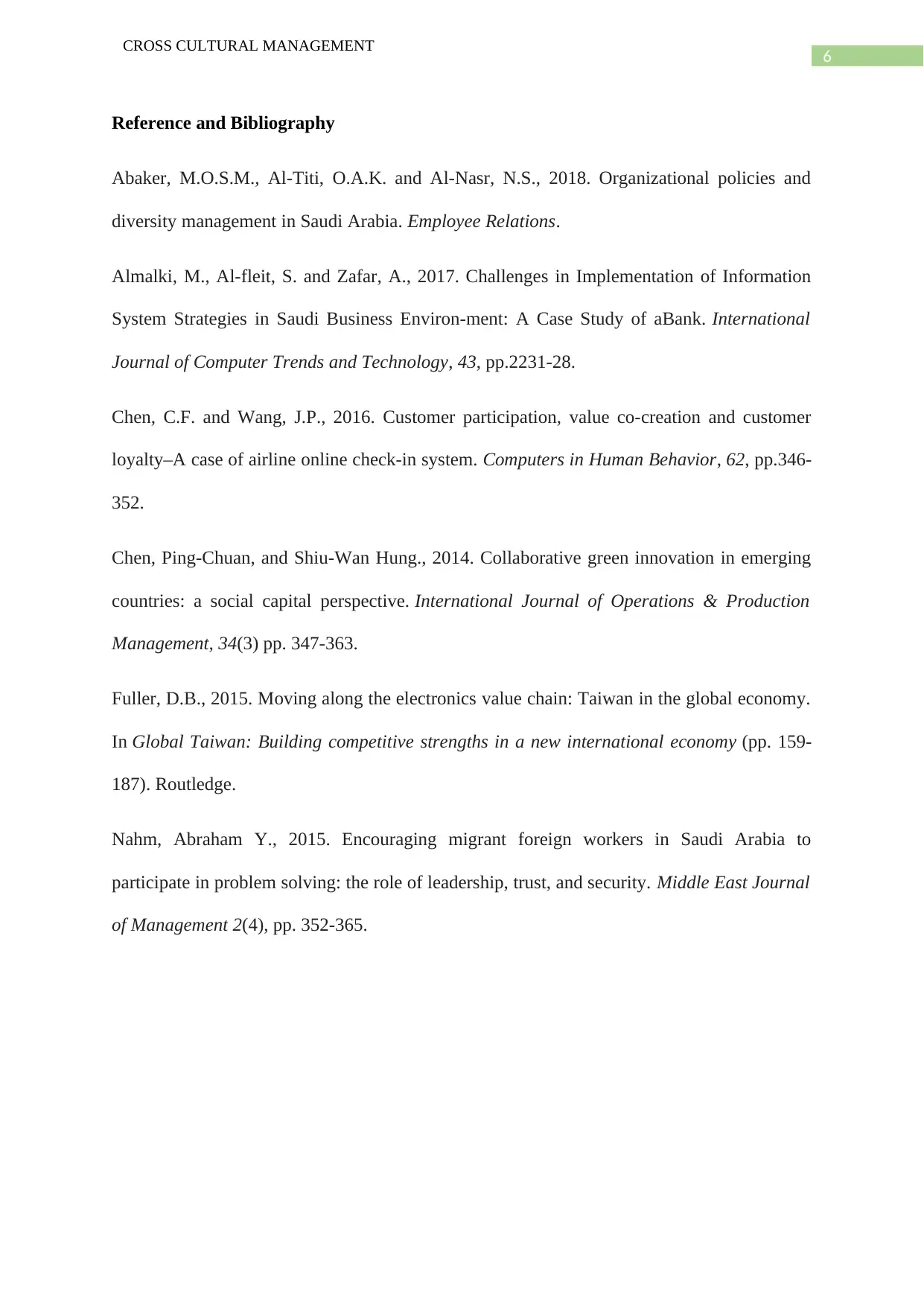
6
CROSS CULTURAL MANAGEMENT
Reference and Bibliography
Abaker, M.O.S.M., Al-Titi, O.A.K. and Al-Nasr, N.S., 2018. Organizational policies and
diversity management in Saudi Arabia. Employee Relations.
Almalki, M., Al-fleit, S. and Zafar, A., 2017. Challenges in Implementation of Information
System Strategies in Saudi Business Environ-ment: A Case Study of aBank. International
Journal of Computer Trends and Technology, 43, pp.2231-28.
Chen, C.F. and Wang, J.P., 2016. Customer participation, value co-creation and customer
loyalty–A case of airline online check-in system. Computers in Human Behavior, 62, pp.346-
352.
Chen, Ping-Chuan, and Shiu-Wan Hung., 2014. Collaborative green innovation in emerging
countries: a social capital perspective. International Journal of Operations & Production
Management, 34(3) pp. 347-363.
Fuller, D.B., 2015. Moving along the electronics value chain: Taiwan in the global economy.
In Global Taiwan: Building competitive strengths in a new international economy (pp. 159-
187). Routledge.
Nahm, Abraham Y., 2015. Encouraging migrant foreign workers in Saudi Arabia to
participate in problem solving: the role of leadership, trust, and security. Middle East Journal
of Management 2(4), pp. 352-365.
CROSS CULTURAL MANAGEMENT
Reference and Bibliography
Abaker, M.O.S.M., Al-Titi, O.A.K. and Al-Nasr, N.S., 2018. Organizational policies and
diversity management in Saudi Arabia. Employee Relations.
Almalki, M., Al-fleit, S. and Zafar, A., 2017. Challenges in Implementation of Information
System Strategies in Saudi Business Environ-ment: A Case Study of aBank. International
Journal of Computer Trends and Technology, 43, pp.2231-28.
Chen, C.F. and Wang, J.P., 2016. Customer participation, value co-creation and customer
loyalty–A case of airline online check-in system. Computers in Human Behavior, 62, pp.346-
352.
Chen, Ping-Chuan, and Shiu-Wan Hung., 2014. Collaborative green innovation in emerging
countries: a social capital perspective. International Journal of Operations & Production
Management, 34(3) pp. 347-363.
Fuller, D.B., 2015. Moving along the electronics value chain: Taiwan in the global economy.
In Global Taiwan: Building competitive strengths in a new international economy (pp. 159-
187). Routledge.
Nahm, Abraham Y., 2015. Encouraging migrant foreign workers in Saudi Arabia to
participate in problem solving: the role of leadership, trust, and security. Middle East Journal
of Management 2(4), pp. 352-365.
⊘ This is a preview!⊘
Do you want full access?
Subscribe today to unlock all pages.

Trusted by 1+ million students worldwide
1 out of 6
Related Documents
Your All-in-One AI-Powered Toolkit for Academic Success.
+13062052269
info@desklib.com
Available 24*7 on WhatsApp / Email
![[object Object]](/_next/static/media/star-bottom.7253800d.svg)
Unlock your academic potential
Copyright © 2020–2026 A2Z Services. All Rights Reserved. Developed and managed by ZUCOL.



